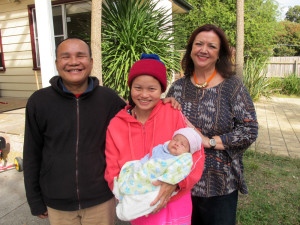Refugee’s smile hides long and tortuous journey to safety

Ngo Way with his family.
Blinded by a land mine explosion, exiled from his boyhood village by a brutal military regime and after more than 20 years stuck in a camp for the displaced, Karen-Burmese refugee Ngo Way still finds reasons to smile.
The 46-year-old has found refuge in Australia. He is now learning English with the help of a volunteer tutor though settlement agency AMES – while witnessing his five young children grow up.
He arrived here last year after more than 20 years behind razor wire in cramped and sodden conditions in a refugee camp on the Thai-Burma border.
He and his wife Hla Win are slowly rebuilding their lives and just a month ago celebrated the birth of their fifth child baby Jasmine.
Ngo and thousands of others like him are refugees from the conflict in Burma which has seen the Burmese government and military persecute minority ethnic groups; attacking and burning their villages.
There are an estimated 150,000 Karen living in camps along the Thai-Burma border.
As a young teenager Ngo was abducted by the military, marched away and forced to work as a porter.
“In the village I studied Karen but in Burma you are not allowed to study Karen so the soldiers would come along and take people away,” he said.
He finally left his village in the 1984 when he and his family were forced to flee as the Burmese army approached.
“The soldiers came to the village and we ran away. We slept in the jungle and we walked for two weeks to get to the border,” Ngo said.
Living in the camp with food scarce, Ngo and his friends would often scavenge for vegetables in nearby forests. He was on such a search when he was blinded by a land mine.
“One day in 1996 we snuck outside the camp to look for vegetable. I stepped on a stick and it accidentally triggered a mine nearby. I was with three friends but I was the only one hurt. I was blinded and lost hearing on my left side,” he said.
Ngo spent a month in hospital before being sent back to the refugee camp unable to see anything.
He says life in the camp was difficult without sight and he was forced to stay at home while his wife Hla Win tried to earn extra money for the family.
“In the camp there were a lot of people but I could not go far. I just stayed at home to look after the children.
“I had no job and no opportunity to do anything or to study,” he said.
But he said coming to Australia has given him and his family a new lease of life.
“Now my children can get a better education and have more opportunities,” Ngo said.
“It is easier to move around here and there are places I can go – not like the camp. And I feel safe for myself and my family,” he said.
“It is good to be here. I am happy,” he smiles.
One of the key factors in his optimism is the support he has been given by AMES and other community organisations.
He and his wife have been helped by AMES community guide Say Gay, a former Karen refugee herself.
Gay has helped the family with things like doctors’ appointments, shopping and schooling; seemingly everyday tasks but daunting ones if you don’t speak the local language and are not familiar with its customs.
The family also has an AMES volunteer English tutor in Michele O’Connell, who is helping Ngo and Hla learn English.
Michele says volunteering is “chicken soup for my soul”.
“I always make sure I have enough time for my refugees.
“And I am still in touch with most of my previous students,” said Michele who has been volunteering for ten years.
“One couple I tutored have just bought their own home – they’re doing really well and it’s great to see. It’s rewarding to see people flourish and get on with their lives.
“I started volunteering when my own kids were babies. It was tricky but it was something I wanted to do so we juggled things.
“One of my first students was terrified to go out in public alone because she was afraid she couldn’t speak English. Now she’s working in a bakery and she’s driving – taking her kids to school.
“I love seeing the difference you can make in people’s lives. It’s fantastic.
Michele says all of her students have visited her home.
“We’ve had things like Australia Day celebrations with lamb chops on the barbecue,” she said.
“It’s been wonderful to share those times with the students and it’s important for my kids to realise how lucky they are,” said Michel who works part-time as a teaching integration aide.
Because of his vision impairment, Michele faces extra challenges in helping Ngo learn English. But she uses some ‘tricks of the trade’ to help him along.
“It’s really different and much more challenging than teaching a sighted person but it’s not impossible,” Michele said.
“We use letters glued to a board and a set of loose letter. And an iPAD is really handy for repeating the alphabet.
“But I feel I get more out of volunteering than I give. It’s very, very rewarding,” Michele said.
AMES Volunteer Coordinator Gitta Clayton says it is easy to underestimate the value of volunteers.
“Volunteering makes such a difference to new arrivals to Australia. As well as helping people learn English, it gives them connections into the community and helps them navigate what can be an unfamiliar new society,” she said.
“We find that the volunteers themselves also get a lot out of these relationships,” Gitta said.
Laurie Nowell
AMES Senior Journalist












